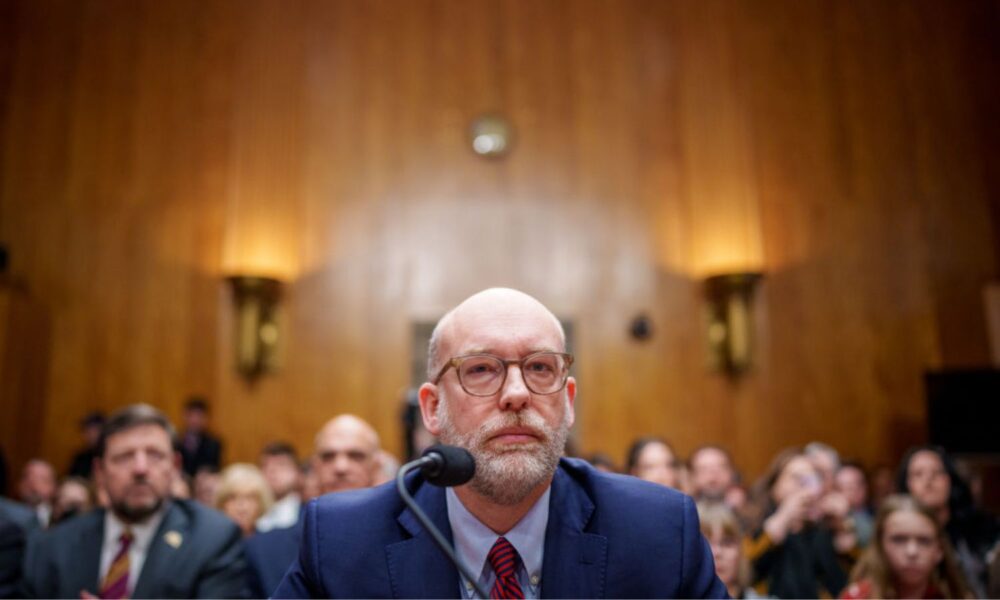This week, Congress is expected to take a final vote on the nomination of Russell Vought to lead the Office of Management and Budget (OMB). It’s hard to imagine a more dangerous and unsuitable candidate than the lead architect of the Project 2025 manifesto, whose harmful agenda is already evident in the destructive actions of the Trump administration. Congress should vote him down before he can cause further harm to the American public while boosting the fortunes of the billionaire class and polluting corporations.
What’s the OMB Director’s role?
The OMB isn’t often in the headlines, but it’s a critical part of the Executive Office of the President, tasked with overseeing federal agencies and evaluating their policies and programs against established guidelines. The OMB is also responsible for preparing the President’s budget, which typically reflects the President’s priorities.
It is important to note, however, that under the US Constitution, once spending bills have been passed by Congress and signed into law, decisions on how to spend US taxpayer money cannot be unilaterally altered by a US President. This separation of powers was made even more sharper by the Impoundment Control Act of 1974 which makes clear that attempts by the President to withhold Congressional appropriations that have been enacted into law is illegal.
Yet this unlawful, unconstitutional overreach is exactly what Vought has repeatedly supported, including during and after his previous stint at OMB in the first term of the Trump administration, and as he outlined in the Project 2025 agenda. As we have seen over the last two weeks, the Trump administration is already following through on an illegal federal funding freeze.
As director of the OMB, Vought would occupy a powerful position over federal agencies and the federal civilian workforce. Here’s what he had to say in 2023 about his intentions for these hardworking civil servants under a second Trump administration:
“We want the bureaucrats to be traumatically affected. When they wake up in the morning, we want them to not want to go to work because they are increasingly viewed as the villains. We want their funding to be shut down so that the EPA can’t do all of the rules against our energy industry because they have no bandwidth financially to do so.
“We want to put them in trauma.”
Those words alone should be enough to disqualify him from ever holding the position to which he’s been nominated. And they also clearly show whose side he’s on: putting the interests of polluting industries ahead of protecting public health and the environment.
Vought and Musk are two of a kind
Over the last two weeks, it’s been stunning and alarming to see the Trump administration allow Elon Musk and his DOGE henchmen to take a hatchet to the federal government, undermining science-based policies and guidance, firing or otherwise attempting to get rid of thousands of career federal employees, gaining illegal access to the Treasury Department’s payment system and sensitive personal information of the American public, and taking steps to destroy USAID by freezing its budget, firing its staff, and spreading rampant disinformation about its work.
Vought has repeatedly voiced strong support for these kinds of actions to decimate federal agencies and force a deregulatory agenda that benefits only powerful corporations. Like Musk, he too believes that the president can completely supersede congressional authority and disregard laws and the US Constitution.
With Vought in charge at the OMB, these destructive efforts would likely be turbo-charged, with rapidly escalating impacts on people across the country.
Vought’s Project 2025 Manifesto
Russell Vought served at OMB during the first Trump administration and has a track record of trying to gut agency budgets and regulations, proposing steep cuts to Medicaid and the Department of Education, and attacking career civil servants using Schedule F. This time around, his dangerous vision for the OMB is fully laid out in Project 2025, which he coauthored. He endorses an OMB that would help oversee and enforce a complete overreach of presidential authority, including authority over budgets and congressionally-authorized spending programs. The fact is that Congress makes the decisions on appropriations, including agency budgets and programs, and then the OMB must exercise lawful oversight on those decisions. It cannot substitute the will of the President for the decisions of Congress.
Simply put, the OMB’s role is to ensure that the budget is spent in accordance with the law—the appropriations bills passed by Congress. But, in Project 2025, Vought writes:
OMB can then direct on behalf of a President the amount, duration, and purpose of any apportioned funding to ensure against waste, fraud, and abuse and ensure consistency with the President’s agenda and applicable laws [emphasis added].
And therein lies the problem: If the President’s agenda diverges from Congressionally enacted law, which one will Vought uphold? The short answer: he will break the law to enable the President to push forward his agenda.
This is not strictly an academic or hypothetical question, because we have already seen the OMB endorse and execute an illegal overreach of presidential power by unilaterally, arbitrarily, and indefinitely freezing federal funding that had already been authorized by Congress. When these funds are frozen, people across the country suffer as they lose access to the benefits, services, and funds that are rightfully theirs. People can lose their jobs, their businesses, and their livelihoods. Even a short pause or uncertainty about funding for essential things like food assistance, housing assistance, and healthcare can be devastating, especially for low-income households.
Russell Vought’s views of the appropriate role of the OMB Director also include these nuggets from Project 2025:
The Director must ensure the appointment of a General Counsel who is respected yet creative and fearless in his or her ability to challenge legal precedents that serve to protect the status quo.
And:
It is vital that the Director and his political staff, not the careerists, drive these offices in pursuit of the President’s actual priorities and not let them set their own agenda based on the wishes of the sprawling “good government” management community in and outside of government.
The danger in these pronouncements is obvious. Vought’s sole aim is to replace the expertise of career employees with political appointees, willing to skirt the law to deliver for the rich and powerful rather than serve the public interest. He is also hell-bent on a deregulatory agenda that would only serve the interests of polluters and other deep-pocketed special interests, while harming people’s health and polluting the air and water. The entire notion of good government for the people is called into question.
During his confirmation hearings, Vought essentially reiterated that he believes the president can overrule Congress in deciding how to spend taxpayer money, despite constitutional authority and law to the contrary. He said: “The president ran on the notion that the Impoundment Control Act is unconstitutional. I agree with that.” Senator Patty Murray pressed him on a number of fronts and concluded that: “No Senator who believes Congress holds the power of the purse should vote for an OMB director who will not respect the laws we pass, or disburse the investments we as lawmakers have secured for our states.”
Taken together with the evidence of the havoc and harm caused in the Trump administration’s first weeks in office, and Vought’s harmful track record during the first Trump administration, Vought’s vision for his job at the OMB is truly alarming—and it is not a hidden agenda at all.
Federal funding freeze shows the harm Vought poses
President Trump’s Day 1 executive orders included several that called for freezing existing federal programs and grants that had already been authorized by Congress. For example, the executive order (EO) on “Unleashing American Energy” called for the elimination of standards to limit pollution from vehicles, and the halting disbursement of elective vehicle-supporting funds and other clean energy incentives passed through the Inflation Reduction Action and Infrastructure Investment and Jobs Act. Other EOs led to the evisceration of programs to promote environmental justice and DEI initiatives.
To be clear, the President does not have this authority under the US Constitution.
As if that were not enough, under acting administrator Matthew Vaeth, the OMB issued an ill-fated memo on January 27 calling for a much wider, across-the-board halt in all federal funding—a move that was such a significant overreach that it was immediately challenged in court with separate lawsuits from a group of non-profits and state attorneys general, and subsequently was rescinded by the OMB on January 29. On January 31, a federal district judge in Rhode Island issued a temporary restraining order against the funding freeze.
Unfortunately, the Trump administration and the OMB have continued to unlawfully withhold federal funding. On February 3, a federal judge in the DC Circuit issued another temporary restraining order against the Trump administration’s freeze on federal grants and loans. It remains to be seen whether the administration will fully comply with this latest order, but no one should hold their breath.
Congress should vote No on Vought
Congress must step up to its constitutional duty to protect the interests of people across the country. It holds the power of the purse, not the President or OMB. And it has the power to ensure that nominees to key cabinet positions are properly vetted, not just rubber-stamped.
The Union of Concerned Scientists is on the record with two letters (here and here) to Congress urging them to reject Vought.
By any reasonable standard, Congress should reject Russell Vought and his dangerous plans. Otherwise, the country will have to deal with the consequences of his harmful and destructive actions for years to come.

